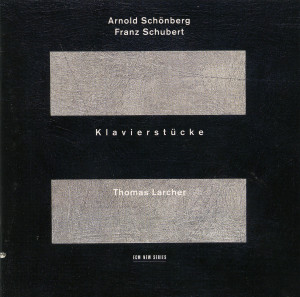Thomas Larcher / Arnold Schönberg / Franz Schubert – Klavierstücke ECM New Series ECM 1667 (1999)
I attend a fair number of classical music performances. It is common for the organizers to program these concerts with an assortment of pieces from different composers. At worst, these present the thinnest possible justification to insert the personality of the organizers into the proceedings. Rather than performances that simply draw out something from the compositions and the individual performances, there is an incessant focus on the reasons put forward for the juxtapositions. This can go as far as performing only brief excerpts of pieces and alternating back and forth between two composers.
Pianist Thomas Larcher’s Klavierstücke follows the format of alternating between two composers: Arnold Schönberg and Franz Schubert. These are not composers of the same school. So obviously there is something intended by the juxtaposition. Surprisingly, the effect is quite wonderful. Schönberg’s 12-tone compositions are the arch-modern radical music of the early 20th Century. Schubert worked a century earlier, and is sometimes thought of a composer of pleasing tunes of a more undistinguished nature. Larcher uses the stereotypical ECM records sound: somber, delicate, austere, with pervasive echo and minimalist self-reverence; and he ties together aspects of the two composers that way. Alternating between older and newer compositions relieves some of the demands of a straight program of modern abstraction, but also demonstrates how Schubert’s compositions have substance too — and how Schönberg’s are more approachable than might be assumed. There is an eeriness to the juxtaposition that seems credited more to the composers than the performer, which is perhaps the greatest praise to be bestowed here.
I picked this up as (sadly) one of the only Schönberg albums available at my local public library, not realizing that it featured Schubert compositions too. While the Schönberg performances on their own don’t rival Maurizio Pollini‘s definitive recordings, the juxtaposition offers a kind of sonic essay that is about contextualizing the music in degrees, or a continuum, of alienation and embrace.

